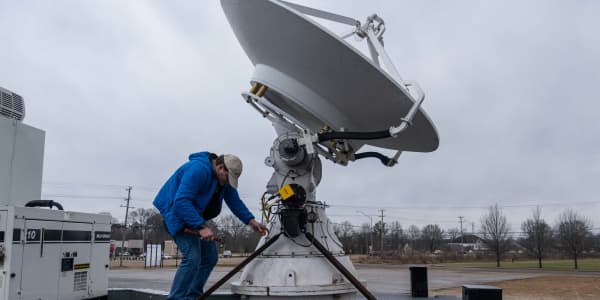Our study is not an opinion survey. We rely on tangible numbers to gauge each state's performance, scoring all 50 states on more than 60 measures of competitiveness, using publicly available data.
To identify our metrics, we seek input from a broad and diverse array of business and policy experts, official government sources, the CNBC Global CFO Council and the states themselves.
States receive points based on their rankings in each metric. We separate those metrics into 10 broad categories. We then assign a point weighting to each category based on how frequently it is used as a selling point in state economic development marketing materials. For example, if more states tout their low business costs, the "Cost of Doing Business" category carries greater weight. That way, our study ranks the states based on the criteria they use to sell themselves.
Here are our categories and this year's weightings.
Workforce (400 points)
Many states point with great pride to the quality and availability of their workers, as well as government-sponsored programs to train them. We rate states based on the education level of their workforce, the numbers of available employees, and the states' demonstrated abilities to retain college-educated workers. We measure workforce productivity based on each state's economic output per job. We look at the relative success of each state's worker training programs in placing their participants in jobs. We also consider union membership and the states' right-to-work laws. While organized labor contends that a union workforce is a quality workforce, that argument, more often than not, does not resonate with business.
Cost of Doing Business (350 points)
Cost is a major consideration when a company chooses where to do business. We look at the competitiveness of each state's tax climate, as well as state-sponsored incentives that can lower the cost of doing business. Utility costs can add up to a huge expense for business, and they vary widely by state. We also consider the cost of wages, as well as rental costs for office and industrial space (rental cost information furnished by CoStar Group).
Infrastructure (350 points)
Access to transportation in all its modes is a key to getting your products to market and your people on the move. We measure the vitality of each state's transportation system by the value of goods shipped by air, waterways, roads and rail. We look at the availability of air travel in each state, the quality of the roads and bridges, and the time it takes to commute to work. We also consider the condition of each state's drinking water and wastewater systems.
Economy (340 points)
A solid economy is good for business. So is a diverse economy, with access to the biggest players in a variety of industries. We look at economic growth, job creation, consumer spending, and the health of the residential real estate market. We measure each state's fiscal health by looking at its credit ratings and outlook, as well as its overall budget picture. Because of their own economic impact as well as the ripple effect, we consider the number of major corporations headquartered in each state.
Quality of Life (325 points)
The best places to do business are also the best places to live. We score the states on livability, including several factors, such as the crime rate; inclusiveness, such as antidiscrimination protections; the quality of health care; the level of health insurance coverage and the overall health of the population. We evaluate local attractions, parks and recreation, as well as environmental quality.
Technology & Innovation (250 points)
Succeeding in the new economy — or any economy — takes innovation. The Top States for Business prize innovation, nurture new ideas and have the infrastructure to support them. We evaluate the states on their support for innovation, the number of patents issued to their residents and the record of high-tech business formation. We also consider federal health, science and agricultural research grants to the states.
Education (200 points)
Education and business go hand in hand. Not only do companies want to draw from an educated pool of workers, they also want to offer their employees a great place to raise a family. Higher-education institutions offer companies a source to recruit new talent, as well as a partner in research and development. We consider the number of higher-education institutions in each state, as well as long-term funding trends for higher education. We look at several measures of K–12 education, including test scores, class size and spending. We also look digital and lifelong learning opportunities in each state.
Business Friendliness (160 points)
Regulation and litigation are the bane of business. Sure, some of each is inevitable. But we grade the states on the freedom their legal and regulatory frameworks provide for business.
Cost of Living (75 points)
The cost of living helps drive the cost of doing business. From housing to food and energy, wages go further when the cost of living is low.
Access to Capital (50 points)
Companies go where the money is, and capital flows to some states more than others. We look at venture capital investments by state, as well as small-business lending on a relative basis.
We rely primarily on federal databases for our research. In the few instances where government statistics are not available, we try to counter any bias by seeking an ideologically diverse array of organizations. Sources for this year's data include:
- ACT
- American Lung Association
- American Society of Civil Engineers
- U.S. Bureau of Economic Analysis
- U.S. Bureau of Labor Statistics
- U.S. Census Bureau
- Center for Regional Economic Competitiveness
- U.S. Chamber Institute for Legal Reform
- The College Board
- CoStar Group
- Council for Community and Economic Research (C2ER)
- U.S. Department of Agriculture
- U.S. Department of Commerce
- U.S. Department of Education
- U.S. Department of Energy
- U.S. Department of Justice
- Education Week Research Center
- U.S. Employment and Training Administration
- U.S. Environmental Protection Agency
- Federal Aviation Administration
- Federal Highway Administration
- Federal Housing Finance Agency
- Foundation for Excellence in Education
- Fraser Institute
- George Mason University
- Good Jobs First
- Information Technology and Innovation Foundation
- Milken Institute
- Moody's Investors Service
- National Association of State Budget Officers
- National Conference of State Legislatures
- National Education Association
- National Institutes of Health
- National Right to Work Legal Defense Foundation
- National Science Foundation
- National Venture Capital Association
- RealtyTrac
- S&P Dow Jones Indices
- State Higher Education Executive Officers
- Tax Foundation
- U.S. Patent and Trademark Office
- U.S. Small Business Administration
- U.S. Surface Transportation Board
- United Health Foundation
Editor's note: An earlier version of this article misstated the name of the U.S. Chamber Institute for Legal Reform, which is an affiliate of the U.S. Chamber of Commerce.






